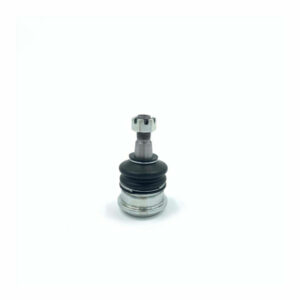Clunking or knocking noise: Worn ball joints can cause a clunking or knocking noise when driving over bumps or rough roads. This noise may be more pronounced when turning or changing lanes.
Uneven tire wear: Worn ball joints can cause uneven tire wear, which may be visible on the inside or outside edges of the tire tread. This can lead to reduced tire life and potential safety hazards.
Steering instability: Worn ball joints can cause steering instability, which may be felt as looseness or play in the steering wheel. This can make it difficult to maintain proper control of the vehicle.
Vibration: Worn ball joints can cause vibration in the steering wheel or vehicle body, particularly at higher speeds.
Reduced handling and stability: Worn ball joints can reduce handling and stability, particularly when cornering or performing evasive maneuvers. This can increase the risk of accidents and potential safety hazards.
Visible wear: In some cases, ball joints may show visible signs of wear, such as cracks, rust, or deformation. Any visible wear should be inspected by a qualified mechanic and the ball joint should be replaced as necessary.
If any of these signs of wear and tear are present, it is important to have the ball joints inspected by a qualified mechanic and replaced as necessary. Proper maintenance and inspection of ball joints can help prevent premature wear and ensure that they are operating safely and effectively.
Worn ball joints can cause damage to other parts of the vehicle. When ball joints wear out, they can cause excessive movement or play in the suspension system, which can lead to wear and tear on other parts of the vehicle. Here are some potential areas of damage that can occur due to worn ball joints:
Tie rods: Worn ball joints can cause excessive movement in the suspension system, which can lead to wear and tear in the tie rods. This can cause handling and steering problems and potentially lead to accidents.
Control arms: Worn ball joints can cause excessive movement in the control arms, which can lead to wear and tear on the bushings and other components. This can cause handling and stability problems and potentially lead to accidents.
Struts and shocks: Worn ball joints can cause excessive movement in the suspension system, which can lead to wear and tear on the struts and shocks. This can cause handling and stability problems and potentially lead to accidents.
Wheel bearings: Worn ball joints can cause excessive movement in the suspension system, ball joint supplier which can lead to wear and tear on the wheel bearings. This can cause noise, vibration, and handling problems and potentially lead to accidents.
Tires: Worn ball joints can cause uneven tire wear, which can lead to premature tire failure and potentially lead to accidents.
Overall, worn ball joints can cause damage to other parts of the vehicle and potentially lead to safety hazards. It is important to have ball joints inspected and replaced as necessary to prevent damage to other parts of the vehicle and ensure safe and reliable operation.

Copyright:@2020-2021
Comments Please sign in or sign up to post.
0
0 of 500 characters used